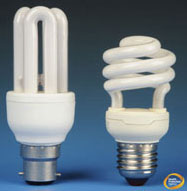Oct 13 2008
New research by the Health Protection Agency has shown that some energy saving compact fluorescent lights can emit ultraviolet radiation at levels that, under certain conditions of use, can result in exposures higher than guideline levels. The Agency and Government Departments are calling on the European Union, relevant product standards bodies and the lighting industry to consider how product standards for lights can be tightened up.
 Typical designs of open (single envelope) fluorescent light bulbs for which HPA precautionary advice applies. They should not be used where people are likely to be in very close proximity (less than 30 cm / 1 ft) to bulbs for prolonged periods (more than 1 hr a day).
Typical designs of open (single envelope) fluorescent light bulbs for which HPA precautionary advice applies. They should not be used where people are likely to be in very close proximity (less than 30 cm / 1 ft) to bulbs for prolonged periods (more than 1 hr a day).
Given its research findings, the Agency is recommending some precautionary measures for the use of certain types of compact fluorescent light bulbs (CFLs). The Agency's view is that open (single envelope) CFLs shown in Fig. 1 should not be used where people are in close proximity - closer than 30 cm or 1 ft - to the bare light bulb for over 1 hour a day. The Agency advises that for such situations open CFLs should be replaced by the encapsulated (double envelope) type shown in Fig. 2. Alternatively, the lamp should be moved so that it is at least 30 cm or 1 ft away.
The Agency's Chief Executive Justin McCracken said, "This is precautionary advice and people should not be thinking of removing these energy saving light bulbs from their homes. We are advising people to avoid using the open light bulbs for prolonged close work until the problem is sorted out and to use encapsulated bulbs instead. In other situations where people are not likely to be very close to the bulbs for any length of time, all types of compact fluorescent light bulbs are safe to use."
Not all open (single envelope) fluorescent light bulbs have significant UVR emissions but if people are in very close proximity to some of them, the exposure to bare skin is like being outside in direct sunlight. For example, Agency scientists found that when very close (2 cm, less than 1 inch) to some open CFLs, the UVR level can be equivalent to that experienced outside in the UK on a sunny day in the summer and so some precaution is warranted. When further away (over 30 cm or 1 ft), the UVR level is much lower and less than being outside on a sunny day in winter, which is not a concern.
Encapsulated (double envelope) compact fluorescent light bulbs (see Fig. 2), which look similar to traditional domestic light bulbs, do not emit significant amounts of UVR. The larger long tube "strip lighting" design fluorescent lights, commonly used in offices, workplaces and homes for many years, can also be used on ceilings without any special precautionary measures.
The precautionary advice from the Agency is interim advice. The Agency's study has stimulated research into the problem by others and the Agency may issue further advice when more information is available. As a result of the Agency's work the Government is pressing the EU to take account of the findings in future European legislation.
Exposure to UVR can cause particular problems for people suffering from some medical conditions, including Lupus. The Agency, Government and the lighting industry have met with patient groups to give advice on the use of compact fluorescent light bulbs and the availability of new technologies for low energy lighting. In addition, the Agency's work has been taken into account by an EC scientific committee looking into the issue of light sensitivity. This committee published its opinion last Friday, 3 October 2008.
Posted 13th Ocotber 2008